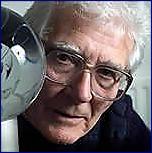Tough-love for a threatened planet
 James Lovelock does not mince words. In 1979 he turned the scientific world on its head with the publication of "Gaia: A New Look At Life On Earth." In a mere 157 pages he laid out a revolutionary hypothesis (developed in collaboration with the brilliant microbiologist Lynn Margulis) that "life on Earth defines the material conditions needed for its survival and makes sure that they are maintained; that living matter is not passive in the face of threats to its existence."
James Lovelock does not mince words. In 1979 he turned the scientific world on its head with the publication of "Gaia: A New Look At Life On Earth." In a mere 157 pages he laid out a revolutionary hypothesis (developed in collaboration with the brilliant microbiologist Lynn Margulis) that "life on Earth defines the material conditions needed for its survival and makes sure that they are maintained; that living matter is not passive in the face of threats to its existence."The Gaia Hypothesis pushed the envelope even further: "The atmosphere seems to have been designed cooperatively by the totality of lving systems to carry out certain necessary control functions. The system appears to exhibit the behavior of a single organism, even a living creature." He named that living creature Gaia after the Greek Earth goddess.
Today global climate change poses one of the greatest threats ever faced by Gaia. And Lovelock is convinced that, just as he predicted in 1979, she will not remain passive when threatened. This year, Lovelock published another compact volume (177 pages) entitled "The Revenge of Gaia: Earth's Climate and the Fate of Humanity". In his new book he writes with a sense of urgency that unless we take action to ameliorate the warming effects resulting from loading the atmosphere with carbon, Gaia will be forced to self-regulate herself to a new equillibrium state that most likely will in all likelihood seriously undermine if not eliminate civilization -- the source of her threat. He proposes the immediate cessation of fossil fuel combustion and the replacement the coal, oil and gas electric generating facilities with with nuclear power plants.
His prescriptions includes harsh indictments of many ideas, concepts and proposed solutions that environmentalists hold dear.
 "I am a green and would be classed among them, but I am most of all a scientist; because of this I entreat my friends among greens to reconsider their naïve belief in sustainable development and renewable energy, and that this and saving energy are all that need to be done. Most of all they must drop their wrongheaded objection to nuclear energy."
"I am a green and would be classed among them, but I am most of all a scientist; because of this I entreat my friends among greens to reconsider their naïve belief in sustainable development and renewable energy, and that this and saving energy are all that need to be done. Most of all they must drop their wrongheaded objection to nuclear energy."
Lovelock questions the notion of sustainability – at least as it is defined by most “greens”. He is, for example, convinced that renewable energy is too inefficient and expensive to positively influence climate change within window of opportunity that scientists feel is open to us. He is not the only environmentalist with this take on energy. Stewart Brand, former editor of the Whole Earth Catalog and Patrick Moore, a founding member of Greenpeace have also become nuclear converts.
Lovelock may, however, be alone when it comes to another of his provocative ideas. He is convinced that farming is at odds with Gaia. Organic agriculture, the darling of most environmentalists, in particular is incapable of meeting the needs of the world's growing population and and at the same time being "Gaia-friendly". So much land would have to be under cultivation that not enough would be available for Gaia to perform vital ecological functions. Consequently he suggests that food, for the most part, should be synthesized from chemicals.
The book's harshest criticism is reserved for cities and city-dwellers. Lovelock condemns "urban environmentalists" for being out of touch with Nature, and consequently for being the source of what he considers wrong-headed, ineffective solutions along the lines of organic agriculture, windfarms and sustainable development. (GW)
Click here to read a New York Times interview with James Lovelock on his views about climaten change and nuclear energy.

0 Comments:
Post a Comment
<< Home